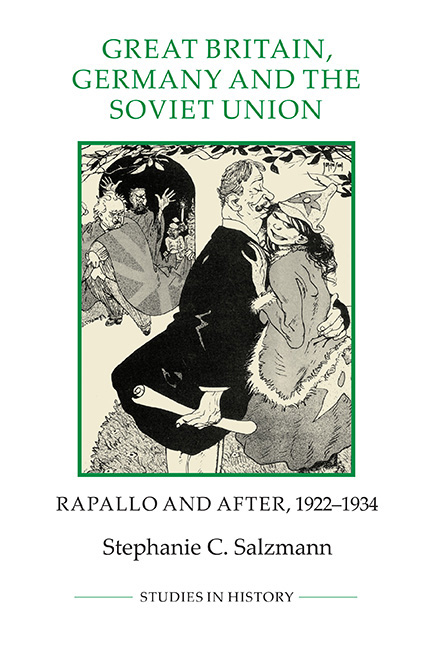Book contents
- Frontmatter
- Contents
- Acknowledgements
- Abbreviations
- Introduction
- 1 ‘It Nearly Overthrew the Applecart’: Lloyd George and the Treaty of Rapallo
- 2 ‘The Most Important Event Since the Armistice’: The Foreign Office and Rapallo
- 3 Rapallo's First Test: The Ruhr Crisis
- 4 The Policy of Conciliation: Rapallo and the First Labour Government
- 5 The Battle for the German Soul: Locarno and the Treaty of Berlin
- 6 Rapallo and the Rupture of Anglo-Soviet Relations
- 7 Rapallo and the Decline of the Locarno Spirit
- 8 An Economic Rapallo?
- 9 Rapallo and the Disarmament Conference
- 10 The Rapallo Relationship and Hitler's Rise to Power
- 11 The End of Rapallo: The German–Polish Non-Aggression Treaty
- Conclusion
- Bibliography
- Index
8 - An Economic Rapallo?
Published online by Cambridge University Press: 29 April 2017
- Frontmatter
- Contents
- Acknowledgements
- Abbreviations
- Introduction
- 1 ‘It Nearly Overthrew the Applecart’: Lloyd George and the Treaty of Rapallo
- 2 ‘The Most Important Event Since the Armistice’: The Foreign Office and Rapallo
- 3 Rapallo's First Test: The Ruhr Crisis
- 4 The Policy of Conciliation: Rapallo and the First Labour Government
- 5 The Battle for the German Soul: Locarno and the Treaty of Berlin
- 6 Rapallo and the Rupture of Anglo-Soviet Relations
- 7 Rapallo and the Decline of the Locarno Spirit
- 8 An Economic Rapallo?
- 9 Rapallo and the Disarmament Conference
- 10 The Rapallo Relationship and Hitler's Rise to Power
- 11 The End of Rapallo: The German–Polish Non-Aggression Treaty
- Conclusion
- Bibliography
- Index
Summary
‘That the Russian threat is economic rather than political in character seems now to be recognised on all sides’, minuted a high-ranking Foreign Office official on 3 March 1931. This remark was made at a high point in the Anglo-German rivalry for business in the Soviet Union, which had been ongoing since the end of the First World War. Germany's position at this time was more favourable for a variety of reasons: her pre-war trade experience with the tsarist empire, the most-favoured nation clause in the Rapallo treaty and the trade agreement of October 1925. Wherever they could, British diplomats therefore tried to follow in the paths which Germany had paved.
International economic co-operation in Russia did not materialise in the 1920s. Germany, Britain and also the United States remained close competitors, not least because the Soviet authorities objected to any form of international co-operation for fear that this would turn into a capitalist front against them. Yet on 4 February 1930 consul-general Moritz Schlesinger, the leading expert on Soviet Russia in the German ministry of foreign affairs, suggested to John Thelwall, the commercial counsellor at the British embassy in Berlin, that there should be closer Anglo-German economic co-operation in the Soviet Union, on the understanding that it should be kept secret from the Moscow government. According to Sir Horace Rumbold, Britain's ambassador in Berlin since 1928, Schlesinger had offered to furnish any information desired about the general trend of business between Germany and Russia, about the amount and length of credit given as well as its terms, ‘in fact anything that we might care to ask, provided, of course, that we gave him similar information if he wanted it’.
This German move might seem extraordinary at first sight. Yet Russo German relations had rarely been worse than at the time of Schlesinger's initiative. Since the 1925 commercial treaty between Berlin and Moscow, the Soviets had been pressing Berlin for a large credit in order to finance Russian orders in Germany. In 1926, the German government eventually granted an export credit guarantee for 300 million Reichsmark in order to secure closer links between the two economies.
- Type
- Chapter
- Information
- Great Britain, Germany and the Soviet UnionRapallo and after, 1922-1934, pp. 102 - 118Publisher: Boydell & BrewerPrint publication year: 2002



